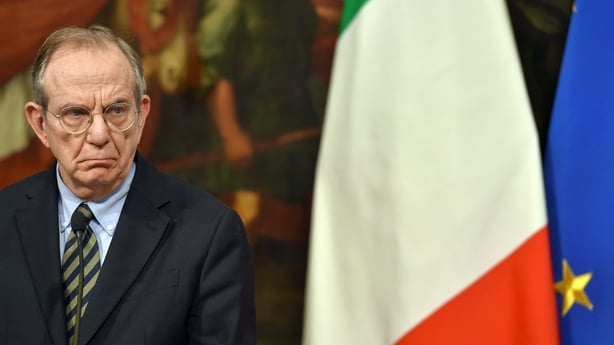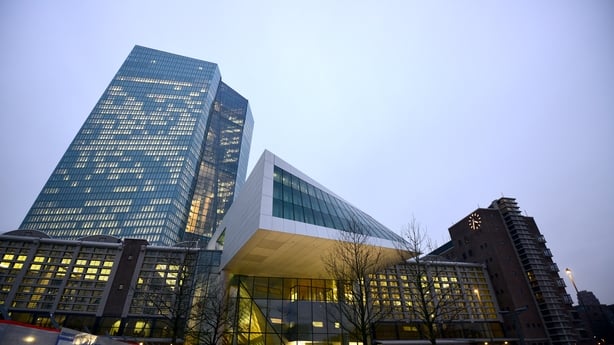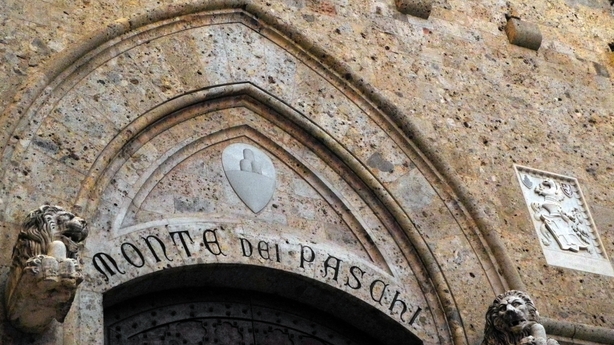The European Central Bank should have explained more clearly why it nearly doubled its estimated capital shortfall for the ailing Monte dei Paschi di Siena, which is being bailed out by the state, Italy's economy minister said.
In unusually critical comments of the euro zone's single banking supervisor, Pier Carlo Padoan said in a newspaper interview the ECB's new capital target was the result of a "very rigid stance" in its assessment of the bank's risk profile.
"It would have been useful, if not kind, to have a bit more information from the ECB about the criteria that led to this assessment," Padoan told financial daily Il Sole 24 Ore.
Monte dei Paschi, Italy's third biggest lender and the world's oldest, said on Monday the ECB had estimated its capital shortfall at €8.8 billion, compared with a €5 billion gap previously indicated by the bank.
The higher capital requirement substantially increases the cost of the bank's rescue by the government after it failed to raise the €5 billion on the market.
The Italian treasury is now set to pump in around €6.5 billion to salvage the lender, raising concerns that its newly created €20 billion bank bailout fund may not have enough money for other weak banks.
The government says the fund is sufficient.
The rest of the money Monte dei Paschi needs will come from the forced conversion of its subordinated bonds into shares, in line with European rules on bank crises.
The lender fared the worst in EU-wide banking stress tests published in July.
Padoan said he expected the capital increase to take place in two to three months.

The ECB told the Italian treasury of its decision in a letter, which Padoan said was just five lines long and which has not been made public.
It irked the Rome government and has quickly turned into a political issue.
A group of lawmakers from the ruling Democratic Party asked Padoan and Italy's foreign minister to explain in parliament what had happened.
"I was a bit surprised to receive the news, out of the blue and on Christmas day," Prime Minister Paolo Gentiloni told a press conference.
"It's important that the reasons behind this assessment are shared and that there is a dialogue because we need to handle this issue together. We will stick to our guns."
The ECB has declined to comment on its rationale for the larger capital shortfall.

A source close to the matter said the bank's estimate of a €5 billion capital gap was based on the results of the stress test, conducted on end-2015 data.
It included assumptions such as the sale of its whole portfolio of defaulting loans - a key plank of its plan to raise money privately.
Given that plan's failure and the bank's worsening balance sheet over the past year, the ECB wants to ensure Monte dei Paschi has enough capital to safely meet a Common Equity Tier 1 (CET 1) ratio of 8% in an adverse scenario, so it would be able to restore investor and customer confidence, the source said.
The source also said the ECB had offered to explain its stance to both the Italian treasury and Monte dei Paschi.
At 8% under the adverse scenario, Monte dei Paschi would still be below the average of the ECB's stress test, in which banks would see their CET 1 ratio fall to 9.4% from 13.2%.
The 8% threshold in the adverse scenario was also a requirement the ECB set for ailing Greek banks in a 2015 review.
Padoan said the exact amount of capital Monte dei Paschi will have to raise will be determined once it presents a new business plan to the ECB and the European Commission, but he played down the bank's problems.

"The bank is in optimal condition and will have great success," he said.
Italy's Economy Minister also said that the ECB's recent request to Monte dei Paschi to plug its capital shortfall will lead the lender to be "hyper-capitalised" but not "over-capitalised".
The minister said the government's rescue of the country's third biggest lender will set an example for future similar banking problems in the rest of Europe.
He added that a delisting of the bank was not on the agenda and hoped that its shares - suspended from trade last week - would resume trading as soon as possible.

